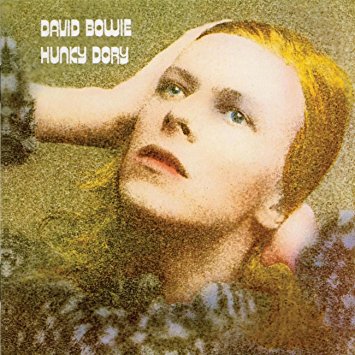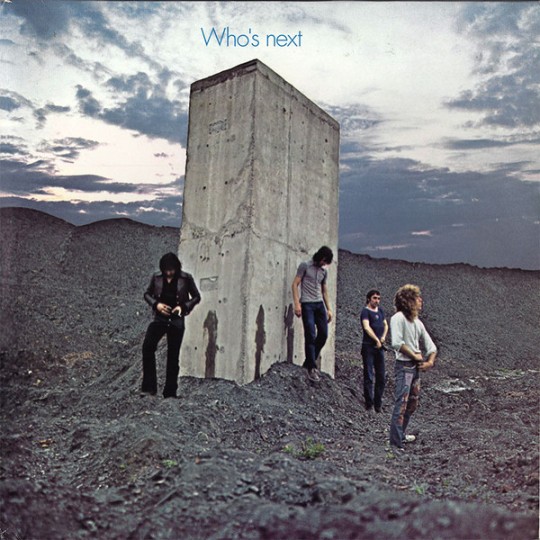If you take a poll asking people what they believe the best year in rock was, odds are they will say 1971. If not, then it will likely be in their top five. In just one short year, rock and roll music as an entire genre was shaken up forever. Classic bands such as The Rolling Stones and The Who placed themselves at the top of the mountain while new acts like David Bowie and Led Zeppelin were leaving infinite ripples in the scene. Trying to narrow all of the amazing albums that were released is harder than understanding The Dark Side of the Moon on your first listen. Nevertheless, I have pulled together a list of the ten greatest rock albums from 1971. This list is in no particular order since trying to rank these albums would be an even more difficult task; There are several albums here that really do deserve the Number 1 spot. Let’s get straight into it!

The Allman Brothers Band, At Fillmore East
One of the biggest problems people usually have with live albums is that they contain a lot of mistakes like any live performance. As bands cannot always play material perfectly when it’s live, this statement is entirely justified. However, there are some diamonds in the rough when it comes to near perfect live albums. At Fillmore East is one of those diamonds that were found in that catalog. Everything clicked during this recorded performance, especially during the twenty-three minute version of “Whipping Post”, which is unlike anything you’ve ever heard. It is without question that At Fillmore East is the not only the best live album of 1971, but one of the best live albums ever released to the public!

David Bowie, Hunky Dory
Perhaps the best quality David Bowie was known for in his illustrious career was his willingness to morph and adapt. Just when you thought you had seen every side of the future Aladdin Sane, he would turn around and reinvent himself. This LP is no exception. Shedding his baroque pop and folk rock influences, Bowie looked to glam rock for more commercial success. Luckily, he hit a home run with The Rise and Fall of Ziggy Stardust and the Spiders from Mars, but Hunky Dory was no slouch in its own right. David showed the world what he was capable of as a true artist between the beautiful piano ballad, “Life on Mars”, and the oddball art rock track, “Andy Warhol”. With David Bowie rapidly reaching his peak back in the early 1970’s, this album was a great first step in the right direction.
Funkadelic, Maggot Brain
While Funkadelic never gained the mainstream attention that sister band, Parliament, they had the ability to defy musical barriers. While Parliament remained consistent with their funky roots, Funkadelic was able to combine funky soul music with psychedelic rock to create one of the most original and unique sounds of that era. This album was the shining moment of guitarist, Eddie Hazel, who’s work on here is nothing short of soulful and brilliant. While the entire album is a fantastic experience to listen, the true standout song is the title track. Once again, Eddie Hazel performs a guitar sonata unlike anything heard before. When looking for a funk rock album to spin, this one should immediately be your go to.

Black Sabbath, Master of Reality
In the year prior to 1971, The Founding Fathers of Metal looked untouchable with their two previous albums, Black Sabbath and Paranoid. Black Sabbath exploded onto the scene with this dark and heavy sound not heard before in psychedelic rock. And just when you thought that they couldn’t get any better than that, the band releases a near masterpiece known as Master of Reality. This album takes the best aspects of the previous LPs and continues to build on those strengths. Ozzy Osbourne’s vocals still great, Tony Iommi delivers monstrous riffs on tracks such as Into the Void and Children of the Grave. However, it must be said how surprising it is how Black Sabbath made yet another classic in 1972’s Vol. 4. When ranking the band’s discography in order, Master of Reality should unquestionably be near the top of that list.

Yes, Fragile
What a time it was to be a progressive rock fan! Bands like Yes, Genesis, ELP, Jethro Tull, and Uriah Heep were breaking into the industry and pushing musical boundaries that were left alone during most of the 1960’s. By fusing psychedelic rock and jazz characteristics together, the end result was a time signature shifting, progression changing series of sounds that culminated into something eccentric but beautiful. Perhaps the most important prog album released in the year of 1971 was Fragile. On the album that debuted Rick Wakeman, he showed just how vital of a component he was to the group. With tracks such as Roundabout, South Side of the Sky, and Heart of the Sunrise on Fragile, Yes cemented themselves as a force in the progressive rock scene.
 John Lennon, Imagine
John Lennon, Imagine
Lennon’s most successful project since the breakup of the Beatles was one to be remembered. Constantly clouded in controversy since his spouse, Yoko Ono, was credited as the one who broke up the Fab Four, Lennon tried to look past that and make an album that would exceed the quality of Paul and George’s solo material. The end result was a mixture of sweet piano ballads, rock tracks that could have been used on Let It Be, and even a blues number. The obvious standout song of this album is the title track. The song where John is telling us to literally imagine what life would be like without religion or possessions. While him saying these things was very outspoken of him back in 1971, Lennon is painting a picture of what an ideal Utopia would look like and how it would operate. Something like that is true art!
Pink Floyd, Meddle
Meddle is the album that many fans consider the turning point of Pink Floyd. Beforehand, the band was still partaking in experimental rock inspired by original founder, Syd Barrett. On Meddle, the group was beginning to find their sound in progressive rock. A move that they haven’t looked back on until their disbanding in 2014. From listening to the opening track, One of these Days, you knew you were in for a rollercoaster ride. Of course the main reason Meddle is held in such high regard is because of it’s B side. An entire side consisting of a twenty-three minute epic known as Echoes showed the world just what Pink Floyd was capable of. While commercial success would be much more apparent on later releases, this album is where the “Pink Floyd sound” began.

Led Zeppelin IV
There is no way this compilation of songs wasn’t going to make it on this list. IV is without doubt one of the best albums made in the 1970’s in general, let alone 1971. But instead of me rambling about how good this album is, I’m going to tell you why it is legendary. This is where Robert Plant’s vocals reached their peak, John Bonham and John Paul Jones were holding down the rhythm section like an impenetrable fort, and Jimmy Page had some of his tastiest guitar licks and riffs. The natural chemistry between this band is shown in all of the tracks, especially fast paced ones like Rock n’ Roll and Four Sticks. Also, who could forget the magical track that is Stairway to Heaven. What starts as a peaceful acoustic ballad turns into this high intensity epic within the span of eight whole minutes. However, the real highlight of this album is When the Levee Breaks. Bonzo produces a drum beat unlike anything ever heard and the band comes up with one of the smoothest blues rock numbers ever recorded. While Led Zeppelin IV may not be my favorite album by them, (that right goes to II) I can definitely say that it is their best work.

The Rolling Stones, Sticky Fingers
The Rolling Stones’ future was looking very uncertain after the release and eventual death of founding member, Brian Jones. While Mick Jagger and Keith Richards were the main songwriters of the group, Jones was the musical genius who experimented enough to make The Rolling Stones authentic and original. But when the Stones released Sticky Fingers, they proved to the world that they could carry on without Brian Jones. Not only that, but they came back onto the scene with a hunger not seen since Beggars Banquet. Those that love that traditional Stones sound would love this album. From up-tempo rockers like Brown Sugar and Bitch to slower acoustic pieces like Wild Horses, Sticky Fingers really has it all. It is crazy to believe that the Stones would be as relevant as they were in the 1960’s. I definitely believe it has something to do with the success of this album

The Who, Who’s Next
What better way to end this list than with The Who? The band was still red hot after the release of Tommy and Live at Leeds. What more could they bring to the table? They could bring a lot more in fact! From the opening keyboard riff on Baba O’ Riley to the deafening screech heard on Won’t Get Fooled Again, Who’s Next Will keep the listener interested. Just like how Zeppelin was on point when recording IV, The Who were at the top of their game when making Who’s Next. Not to mention that the album has some of the first instances of power ballads. Songs like The Song is Over and Behind Blue Eyes provided the groundwork of what the power ballad would become. And no one could think of a better ending to an album than Won’t Get Fooled Again. That track will always be in contest for the greatest song The Who made.


